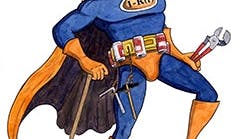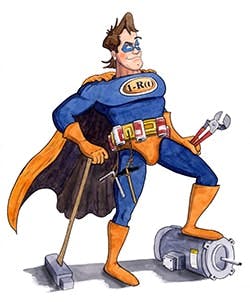In today’s technological age, with the push for artificial intelligence, the internet of things, etc., why is it still so difficult to engineer a great solution all the while doing none of the work?
Should this be the case? I mean, if we are so far advanced as a society, why is it that most projects do not seem to bring a return on investment or achieve an 85% OEE right off the jump?
If you want to get out of doing the work, here are five societal and not-so-technological advancements that you can hone to get out of doing the work.
1. Incompetence. We see this nearly every day. This method is risky though. To some, this comes naturally, and these people continue to get praised and get more work piled on them.
To do this right, you must toe the line: Only be incompetent enough to mess one or two things up during the life of the project. For example, put an e-stop out of reach of employees, or make the machine ergonomically incorrect. If you show your incompetence throughout the project, you will probably get promoted.
2. Blowing the schedule. This one is self-explanatory. If you were on schedule to complete the project in 120 days, then make it last 200 days. If you are still in the scheduling phase, promise to have it completed 90 days before you know you can get it completed. This is a sure-fire way to make sure that the next project does not come your way.
3. Blowing the budget. Just like its counterpart blowing the schedule, blowing the budget is pretty straight-forward. If you were approved for $1 million, then spend $2 million. If you are still budgeting for the project, only ask for half of what you need. I am sure that by doing this you will probably never work again. This is pretty exciting for those that are looking to get out of work.
4. Blame and fake outrage. Debatably the greatest advancement within human existence is blame. We seem to get better and better at it as we advance through the ages.
It used to be that when mistakes were made, it was right to own up to those mistakes and work to make it better. It used to be that when you were a poor performer, you would be terminated from employment. This would incentivize you to give your all and take pride in your work. It used to be that you were held accountable to specific tasks and to certain conduct.
Why do I mention these things? Because this is no longer the case. Now it is dire that you become a master of blame and fake outrage. Did you just get caught embezzling money? Not to worry, just go on a rant about discrimination. Did you miss your budget or target? No worries, just accuse them of doing the same thing and not getting in trouble for it. Equipment does not perform how you promised? No worries, just blame it on operator incompetence.
Becoming a master at blame and fake outrage is a great way to get people off your back all the while being allowed to fail at your job. The great news is that you will still get paid no matter what!
5. Doing it right. Doing a project right is almost unheard of. This rare creature normally gets shot down in the budget review meeting. Why, you ask? Normally because of the upfront cost of doing the project right. Most organizations do not see the value in that and would rather pay 10 to 40 times more over the life of the asset.
Every time you propose doing a project right you will lose a little credibility in the eyes of the incompetents above you. As you continue to lose that credibility, fewer and fewer projects will get thrown your way. This is a great way to get out of having to do work while still collecting a paycheck.
I hope that these 5 tips will help ease the stress of having to do some work while you still have a job and are still getting paid. Remember, in today’s societal advancement, right and wrong are a matter of opinion, so use this to your advantage!

